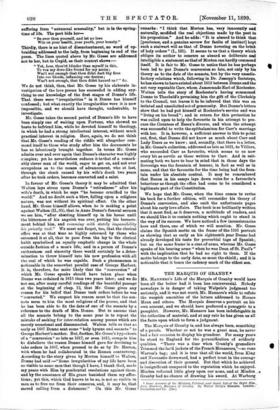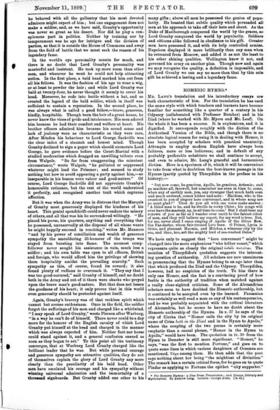THE MARQUIS OF GRANBY.* MR. MANNERS'S Life of the Marquis
of Granby would have been all the better had it been less controversiaL Nobody nowadays is in danger of taking Walpole's judgment too seriously, and it was not worth Mr. Matmers's while to refute the waspish amenities of the letters addressed to Horace Mann and others. The Marquis deserves a portrait on his own account, and we should have preferred a panegyric to a pamphlet. However, Mr. Manners has been indefatigable in the collection of material, and at any rate he has given us all the facts upon which to form a judgment.
The Marquis of Granby is, and has always been, something of a puzzle. Whether or not he was a great man, he never had a fair occasion to display his grandeur. For many years he stood to England for the personification of soldierly qualities. "There was a time when Granby's grenadiers Trimmed the lac'd jackets of the French Mounseers,"—so runs Warton's tag ; and it is true that all the world, from Sing and Newcastle downward, had a perfect trust in the courage and discretion of their general. But that which he achieved is insignificant compared to the reputation which he enjoyed. Minden reflected little glory upon our arms, and at Minden 7 Granby had no chance of drawing his sword. At Warburg Some Account of the 3filitary, Political, and Social Life of the Eight Hon. John Manners, Marquis of Granby. By Walter Evelyn Manners. London: Macmillan and Co. [Us.]
he behaved with all the gallantry that his most devoted admirers might expect of him ; but one engagement does not make a soldier, and, as we have said, Granby's opportunity was never so great as his desert. Nor did he play a con- spicuous part in politico. Neither by training nor by temperament was he apt for intrigue and the division of parties, so that it is outside the House of Commons and away from the field of battle that we must seek the reason of his legendary fame.
In the world's eye personality counts for much, and there is no doubt that Lord Granby's personality was masterful and insistent. He took up more room than other men, and wherever he went he could not help attracting notice. In the first place, a bald head marked him out from all his fellows. It was the fashion of his age to wear a wig, or at least to powder the hair ; and while Lord Granby was bald at twenty-four, he never thought it seemly to cover his head. Moreover, he rode into battle without a hat, and so created the legend of the bald soldier, which in itself was sufficient to sustain a reputation. In the second place, he was always what is called a good fellow,—brave, generous, kindly, hospitable. Though born the heir of a great house, he never knew the vices of pride and intolerance. His men adored him because he had their comfort and welfare at heart. His brother officers admired him because his sound sense and lack of jealousy were as characteristic as they were rare, After Minden his behaviour to Lord George Sackville was the clear index of a staunch and honest mind. Though Granby declined to sign a paper which should exonerate Lord George, he gave evidence before the Court-Martial with a studied moderation which dragged an unwilling tribute even from Walpole. "So far from exaggerating the minutest circumstance," wrote Walpole, "he palliated or suppressed whatever might load the Prisoner ; and seemed to study nothing but how to avoid appearing a party against him,—so inseparable in his bosom were valour and good-nature." Of course, Lord George Sackville did not appreciate Granby's honourable reticence, but the rest of the world understood it perfectly, and recognised another trait which captures affection.
But it was when the Army was in distress that the Marquis of Granby most generously displayed the kindness of his heart. This genial spendthrift could never endure the misery of others, and all that was his he surrendered willingly. "He placed his purse, his quarters, anything and everything that he possessed, unreservedly at the disposal of all whose wants he might happily succeed in reaching," writes Mr. Manners "and by his power of conciliation and wealth of generous sympathy the smouldering ill-humour of the troops was stayed from bursting into flame. The meanest camp- follower never sought his assistance in vain, much less a soldier ; and his own table was open to all officers, British and foreign, who would afford him the privilege of showing them hospitality amidst the prevailing scarcity." Such sympathy as this, of course, found its reward ; it also found plenty of ruffians to overreach it. "They say that I was too good-natured," said Granby of himself, and no doubt both in the Army and out of it there were sharks who preyed upon the brave man's good-nature. But that does not lessen the goodness of his heart; it only proves that in this world even generosity should be protected against itself.
Again, Granby's bravery was of that reckless spirit which cannot but arouse enthusiasm. Once in the field, the soldier forgot the sufferings of his men and charged like a whirlwind. "I may speak of Lord Granby," wrote Pierson after Warburg, "in a way he can't do of himself. There never could be a day more for the honour of the English cavalry of which Lord Granby put himself at the head and charged in the manner which was always expected of him. Neither foot nor horse could stand against it, and a general confusion ensued as soon as they began to act." To this point all the testimony converges, that at Warburg Lord Cranby charged like the brilliant leader that he was. But while personal courage and generous sympathy are attractive qualities, they do not of themselves explain the glory of Lord Granby any more clearly than the peculiarity of his bald bead. Other men have emulated his courage and his sympathy without winning universal admiration and the immortality of a thousand signboards. But Granby added one other to his many gifts ; above all men he possessed the genius of popu- larity. He boasted that subtle quality which persuaded all men at his approach to take off their hats and shout. As the Duke of Marlborough conquered the world by the graces, so Lord Granby conquered the world by popularity. Soldiers and citizens alike followed in obedience to his gift. Greater men have possessed it, and with its help controlled armies. Napoleondisplayed it more brilliantly than any man when he retreated from Moscow, and added it as not the least to' his other shining qualities. Wellington knew it not, and governed his army on another plan. Though now and again we may recognise the quality, a definition is impossible, and of Lord Granby we can say no more than that by this sole gift he achieved a lasting and a legendary fame.











































 Previous page
Previous page